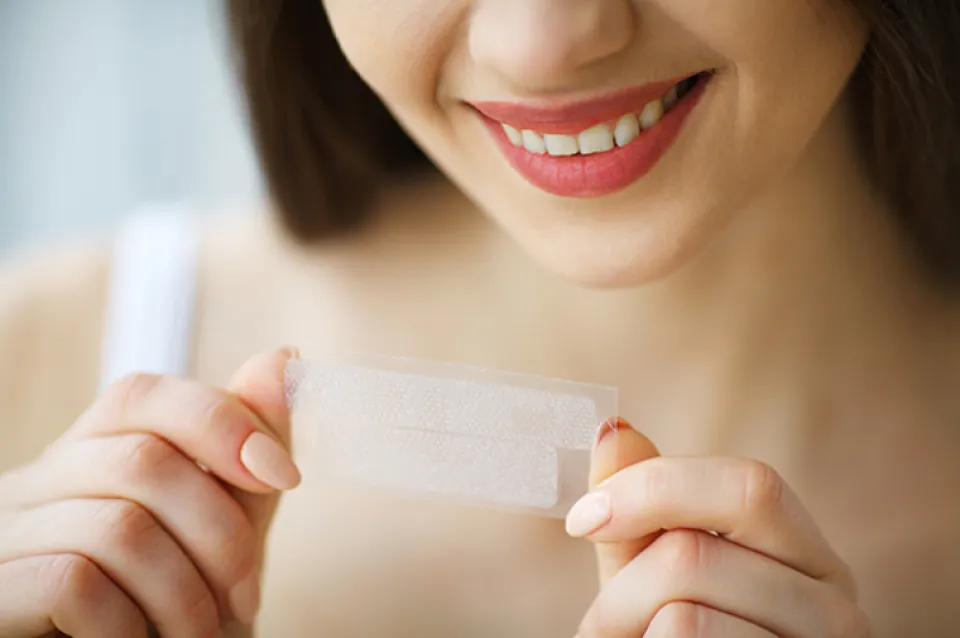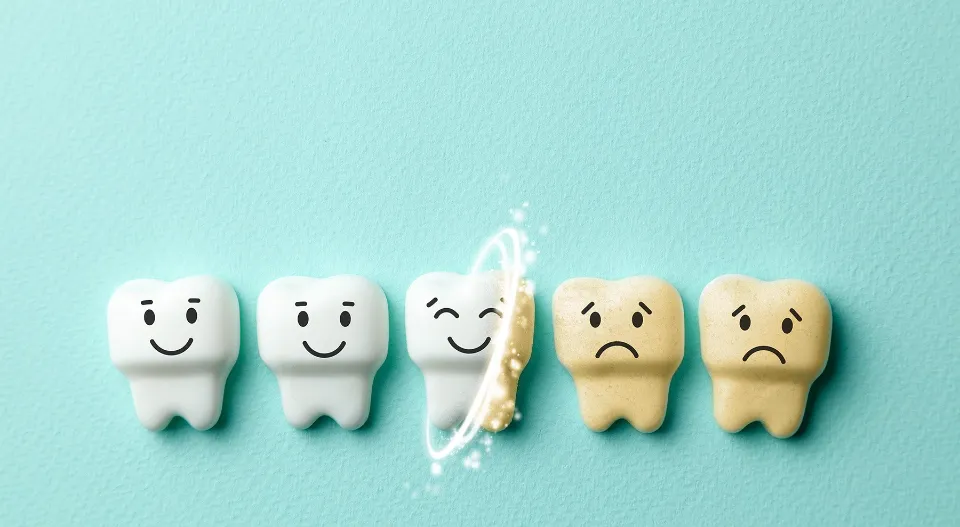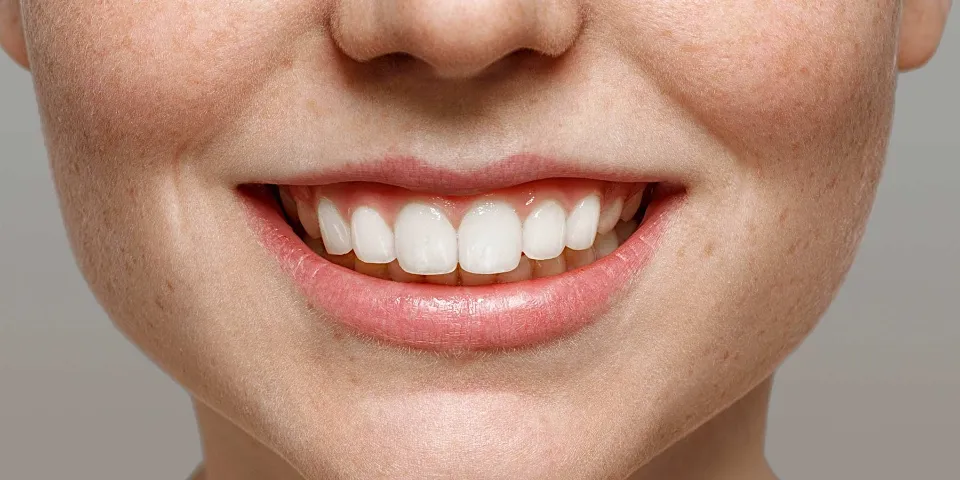Do whitening strips damage enamel has become a popular question. While they do offer a quick solution to your teeth whitening needs, their use comes with a few harmful side effects, like increased sensitivity and enamel damage.
We’ll explore the causes and effects of tooth pain after using whitening strips in this article. Along the way, we’ll talk about some coping mechanisms you can employ.
To learn more, continue reading!
Do Whitening Strips Damage Enamel?
Yes, whitening strips do damage enamel. There are three layers in your teeth: connective tissue, dentin, and enamel. The dentin layer contains many collagen proteins and has a high protein content. Your enamel needs the support and fortification provided by your dentin.
A group of researchers at Stockton University conducted a study to find out what white strips do to these layers.
They used whitening strips on extracted human teeth and kept track of the dentin layer’s protein levels to see how the strips affected those levels.

As a result of shrinking proteins, hydrogen peroxide, one of the main components in whitening products like the strips they used, weakened the dentin layer, according to their findings.
More harm was done to the extracted teeth treated three times with whitening strips, and the collagen proteins were shrunk even further.
The Dangers of Teeth Whitening Strips
The bleaching aspect of teeth whitening strips is an important part of the entire whitening process.
While it might not be as intense as the gels used by dentists, the bleaching chemical is still harsh enough to damage your gum’s soft tissue. For this reason, you must make every effort to keep the whitening strips away from your gums.
This is unfortunately easier said than done. Consider using scissors to cut the strips to match your smile for more exact placement.
Related Post:
- Are Whitening Strips Bad for Your Teeth?
- Can You Use Whitening Strips While Pregnant?
- What Happens If You Leave Whitening Strips on Too Long?
How to Ease Teeth Sensitivity While Using Whitening Strips?

When using whitening strips to whiten your teeth, it is a good idea to follow a few common sense steps to reduce tooth sensitivity.
- Even if you are using whitening strips at home, ask your dentist about their instructions. When using over-the-counter medications, they may be able to advise you on safety measures. They can also provide advice on how to manage teeth sensitivity brought on by using the strips. Their advice will be more situation- and need-specific and more effective.
- Reduce the amount of time you wear the whitening strips. Your teeth will feel less sensitive when you have less contact with the hydrogen peroxide in the whitening strips. After teeth whitening, shorter application times can significantly reduce sensitivity. Additionally, you can try using the whitening strips just once every other day or even less frequently than that.
- Switch to a whitening strip brand with a smaller amount of hydrogen peroxide level. Due to the low concentration of hydrogen peroxide, a lower percentage of hydrogen peroxide will lessen the amount of irritation on your teeth. One study looks at two groups who use whitening strips with 4% hydrogen peroxide concentration, and 10% hydrogen concentration respectively. According to the study, both whitening strips significantly improved the color change. But it also showed that whitening strips with 10% hydrogen peroxide increased the risk and the intensity of tooth sensitivity.
- You should avoid consuming any hot food or cold beverages as well as acidic foods while you do whitening strips. These foods and beverages’ extreme temperatures may irritate your sensitive teeth. Read on Can You Eat After Whitening Strips for more information.
- Be careful about not using too many tooth whitening strips in a certain period of time. When using whitening strips, people may become overly enthusiastic about the results they achieve and apply too many at once. They might also leave them for too long, in a similar manner. Don’t take the chance of hurting your teeth or making them too sensitive; instead, be aware of the state of your teeth.
- Use sensitive teeth toothpaste, and brush with warm water. Fluoride-containing toothpaste for sensitive teeth and fluoride-containing mouth rinses can both reduce sensitivity. Both before and after your treatment, you can use them.
- Pay attention to your brushes. Hard-bristled brushes can make your teeth more sensitive and hurt more if you use them. Consider using a toothbrush with soft bristles and brush gently.
- Consider getting a professional teeth whitening treatment. The best and safest results for changing the color of your teeth can be obtained by undergoing a professional teeth-whitening procedure. If you experience sensitivity while the whitening process is being done, your dentist will be aware of your needs and be able to provide you with the proper care.
Read More: Should I Brush My Teeth After Using Whitening Strips?
Final Thoughts: Do Whitening Strips Damage Enamel
Americans have spent over a billion dollars on whitening strips and other teeth-whitening products because they place such a high value on having a beautiful smile.
To be on the safer side, use whitening strips in moderation, as overuse will not only cause tooth sensitivity over time, but it will also permanently damage your tooth’s enamel and the surface below.
Once enamel has worn away, it cannot be replaced, leaving the nerves of your tooth susceptible to sensitivity to temperature, tooth decay, and other more serious problems.
Prior to using whitening strips, always adhere to the suggested time frame and check the condition of your teeth.
Read More: Best Whitening Strips
FAQs
Are Crest Whitening Strips Bad for Your Teeth?
Crest 3D Glamorous Whitestrips is approved by the American Dental Association, and are considered safe when used occasionally and in moderation.
Are Whitening Strips Bad for Your Gums?
While it might not be as intense as the gels used by dentists, the bleaching chemical is still harsh enough to damage your gum’s soft tissue.
Do Crest Whitestrips Destroy Enamel?
The majority of whitening strips are safe to use; however, if you use whitening strips that contain chlorine dioxide, you could destroy the enamel on your teeth.




